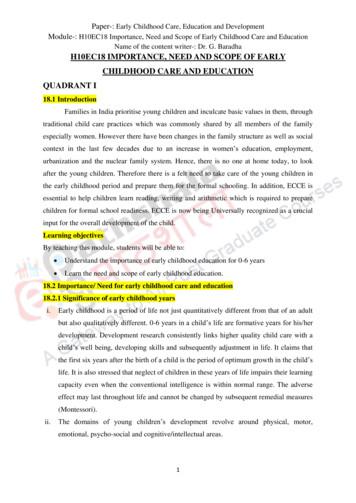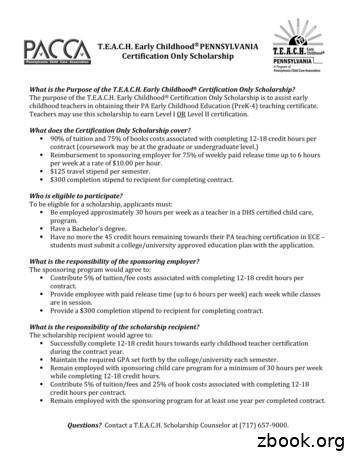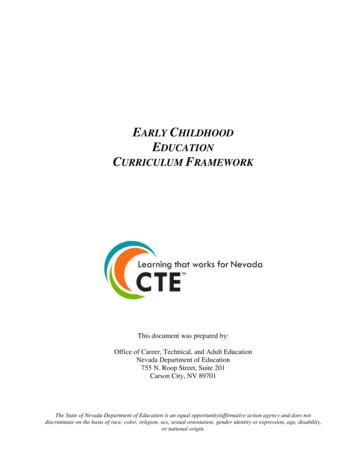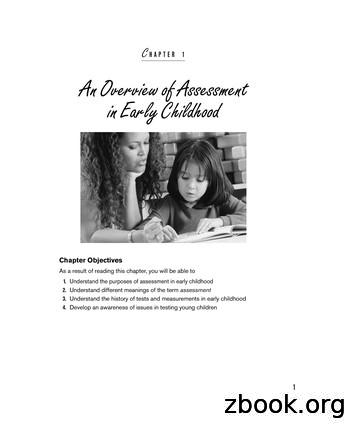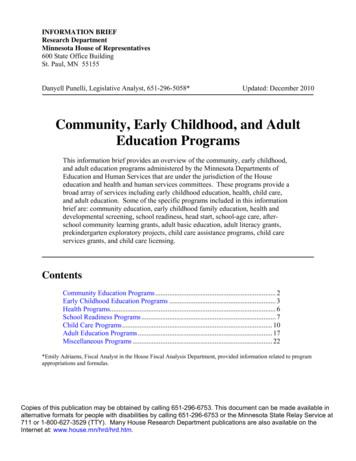Program Planning Guide Early Childhood Education Associates In . - CCCC
Program Planning GuideEarly Childhood Education Associates in Applied Science Degree (A55220C)Program Length: 5 SemestersCareer Pathway Options: Associate in Applied Science Early Childhood Education DegreeProgram site/s:Suggested Course Schedule1st Semester (Fall)ACAStudent Success CourseEDU 119Intro to Early Child EducationEDU 131Child, Family, & CommunityEDU 144Child Development IENG 111Writing & InquirySemester Hour Totals:HoursLabClinicClassCredit NOTES:433313/14000020000014333142nd Semester (Spring)EDU 145Child Development IIEDU 146Child GuidanceEDU 151Creative ActivitiesEDU 153Health, Safety & NutritionCommunications: take one:ENG 112Writing/Research in the DiscENG 114Prof Research & ReportingENG 115Oral CommunicationENG 116Technical Report WritingCOM 110Introduction to CommunicationCOM 120Intro Interpersonal ComCOM 231Public SpeakingSemester Hour Totals:333330000000000333331500153rd Semester (Summer)EDU 221Children with ExceptionalitiesHumanities/Fine Arts ElectiveSemester Hour 4153310090003344th Semester (Fall)EDU 234Infants, Toddlers, & TwosEDU 252Math & Science ActivitiesEDU 271Educational TechnologySocial/Behavioral Science ElectiveMathematics requirement-take one:MAT 110Math Measurement & LiteracyMAT 143Quantitative LiteracyPHY 121Applied Physics ISemester Hour Totals:5th Semester (Spring)EDU 259Curriculum PlanningEDU 280Literacy ExperiencesEDU 284Early Child Capstone Prac
Page 2Early Childhood Education Technology AAS (A55220C)Elective -EDU 158EDU 163EDU 175EDU 177EDU 179EDU 216EDU 235EDU 261EDU 262EDU 263EDU 281take two courses:Healthy Lifestyles-YouthClassroom Mgmt & InstructionIntro to Trade & IndustriInstructional MethodsVocational Student Organ.Foundations of EducationSchool-Age Develop & ProgramsEarly Childhood Admin IEarly Childhood Admin IISchool-Age Program AdminInstruc Strat/Read & WritSemester Hour 3139016Total Semester Hours Required to Graduate: 65Course Descriptions:ACA 111College Student Success1-0-1This course introduces the college's physical, academic, and social environment and promotes the personal development essential forsuccess. Topics include campus facilities and resources; policies, procedures, and programs; study skills; and life management issuessuch as health, self-esteem, motivation, goal-setting, diversity, and communication. Upon completion, students should be able tofunction effectively within the college environment to meet their educational objectives.ACA 115Success & Study Skills0-2-1This course provides an orientation to the campus resources and academic skills necessary to achieve educational objectives.Emphasis is placed on an exploration of facilities and services, study skills, library skills, self-assessment, wellness, goal-setting, andcritical thinking. Upon completion, students should be able to manage their learning experiences to successfully meet educationalgoals.ACA 122College Transfer Success0-2-1This course provides information and strategies necessary to develop clear academic and professional goals beyond the communitycollege experience. Topics include the CAA, college policies and culture, career exploration, gathering information on seniorinstitutions, strategic planning, critical thinking, and communications skills for a successful academic transition. Upon completion,students should be able to develop an academic plan to transition successfully to senior institutions. This course has been approvedfor transfer under the CAA and ICAA as a premajor and/or elective course requirement.COM 110Introduction to Communication3-0-3This course provides an overview of the basic concepts of communication and the skills necessary to communicate in variouscontexts. Emphasis is placed on communication theories and techniques used in interpersonal group, public, intercultural, and masscommunication situations. Upon completion, students should be able to explain and illustrate the forms and purposes of humancommunication in a variety of contexts. This course has been approved for transfer under the CAA and ICAA as a general educationcourse in Communication.COM 120Intro Interpersonal Com3-0-3This course introduces the practices and principles of interpersonal communication in both dyadic and group settings. Emphasis isplaced on the communication process, perception, listening, self-disclosure, speech apprehension, ethics, nonverbal communication,conflict, power, and dysfunctional communication relationships. Upon completion, students should be able to demonstrateinterpersonal communication skills, apply basic principles of group discussion, and manage conflict in interpersonal communicationsituations. This course has been approved for transfer under the CAA & ICAA as a general education course in Communication.COM 231Public Speaking3-0-3This course provides instruction and experience in preparation and delivery of speeches within a public setting and group discussion.Emphasis is placed on research, preparation, delivery, and evaluation of informative, persuasive, and special occasion public speaking.Upon completion, students should be able to prepare and deliver well-organized speeches and participate in group discussion withappropriate audiovisual support. This course has been approved for transfer under the CAA and ICAA as a general education course in
Early Childhood Education Technology Degree (A55220C)Course DescriptionsEDU 119Intro to Early Child Educ4-0-4This course introduces the foundations of early childhoodeducation, the diverse educational settings for young children,professionalism and planning intentional developmentallyappropriate experiences for each child. Topics include theoreticalfoundations, national early learning standards, NC Foundations forEarly Learning and Development, state regulations, program types,career options, professionalism, ethical conduct, quality inclusiveenvironments, and curriculum responsive to the needs of eachchild/family. Upon completion, students should be able to design acareer/professional development plan, appropriate environments,schedules, and activity plans.EDU 131Child, Family, & Community3-0-3Corequisites: DRE 097This course covers the development of partnerships betweenculturally, linguistically and ability diverse families, children,schools and communities through the use of evidence-basedstrategies. Emphasis is placed on developing skills and identifyingbenefits for establishing, supporting, and maintaining respectful,collaborative relationships between diverse families,programs/schools, and community agencies/resources reflectiveof the NAEYC Code of Ethical Conduct. Upon completion, studentsshould be able to identify appropriate relationship buildingstrategies between diverse families, children, schools, andcommunities and demonstrate a variety of communication skillsincluding appropriate use of technology to support every child.EDU 144Child Development I3-0-3Corequisites: DRE 097This course includes the theories of child development,observation and assessment, milestones, and factors thatinfluence development, from conception through approximately36 months. Emphasis is placed on knowledge, observation andassessment of developmental sequences in approaches toplay/learning, emotional/social, health/physical,language/communication and cognitive domains. Uponcompletion, students should be able to compare/contrasttypical/atypical developmental characteristics, explain biologicaland environmental factors that impact development, and identifyevidence-based strategies for enhancing development for childrenthat are culturally, linguistically, and ability diverse. This coursehas been approved for transfer under the CAA and ICAA as apremajor and/or elective course requirement.EDU 145Child Development II3-0-3Corequiste: DRE 097This course includes the theories of child development,observation and assessment, milestones, and factors thatinfluence development, from preschool through middle childhood.Emphasis is placed on knowledge, observation and assessment ofdevelopmental sequences in approaches to play/learning,emotional/social, health/physical, language/communication andcognitive domains. Upon completion, students should be able tocompare/contrast typical/atypical developmental characteristics,explain biological and environmental factors that impactdevelopment, and identify evidence-based strategies forenhancing development for children that are culturally,linguistically, and ability diverse. This course has been approved 3 for transfer under the CAA and ICAA as a premajor and/or electivecourse requirement.EDU 146Child Guidance3-0-3Corequisite: DRE 097This course introduces evidence-based strategies to buildnurturing relationships with each child by applying principles andpractical techniques to facilitate developmentally appropriateguidance. Topics include designing responsive/supportive learningenvironments, cultural, linguistic and socio-economic influenceson behavior, appropriate expectations, the importance ofcommunication with children/families including using technologyand the use of formative assessments in establishing intentionalstrategies for children with unique needs. Upon completion,students should be able to demonstrate direct/indirect strategiesto encourage social skills, self-regulation, emotional expressionand positive behaviors while recognizing the relationship betweenchildren's social, emotional and cognitive development.EDU 151Creative Activities3-0-3Corequisite: DRE 097This course introduces developmentally supportive creativelearning environments with attention to divergent thinking,creative problem-solving, evidence-based teaching practices, andopen-ended learning materials while applying NC Foundations forEarly Learning and Development. Emphasis is placed onobservation of process driven learning experiences in art, music,creative movement, dance, and dramatics for every young childage birth through eight, integrated through all domains andacademic content. Upon completion, students should be able toexamine, create, and adapt developmentally creative learningmaterials, experiences, and environments for children that areculturally, linguistically, and ability diverse.EDU 153Health, Safety & Nutrition3-0-3Corequisite: DRE 097This course covers promoting and maintaining the health and wellbeing of every child. Topics include health and nutritionalguidelines, common childhood illnesses, maintaining safe andhealthy learning environments, health benefits of active play,recognition and reporting of abuse/neglect, and state regulations.Upon completion, students should be able to apply knowledge ofNC Foundations for Early Learning and Development for health,safety, nutritional needs and safe learning environments.EDU 158Healthy Lifestyles – Youth3-0-3Corequisite: DRE 097This course introduces the topics of health, safety, nutrition,physical activities and environments for the school-agechild/youth that promote development, fitness and healthylifestyles. Topics include the use of physical andnutritional/cooking activities (indoor/outdoor, teacherdirected/youth-directed) appropriate for youth developingtypically/atypically; safe/healthy menu planning; safe/healthyenvironmental design, assessment and supervision. Uponcompletion, students should be able to plan/facilitate safe/healthyphysical and nutritional/cooking activities, discuss safetypolicies/regulations and identify health/safety/nutritional needs ofyouth.
Early Childhood Education Technology Degree (A55220C)Course DescriptionsEDU 163Classroom Mgmt & Instruction3-0-3Corequisite: DRE 097This course examines classroom management and evidence-basedinstructional strategies that create supportive learningenvironments to provide developmentally appropriate guidancefor school-age populations. Topics include classroom managementand organization, teaching strategies, individual studentdifferences and learning styles, ongoing systematic observation,and developmentally appropriate classroom guidance techniques.Upon completion, students should be able to utilizedevelopmentally appropriate behavior management and highquality instructional strategies that enhance the teaching/learningprocess and promote students' academic success.EDU 175Intro to Trade & Indstr3-0-3Corequisite: DRE 097This course introduces the philosophy, scope, and objectives ofindustrial education. Topics include the development of industrialeducation, employment opportunities, current events, currentpractices, and emerging trends. Upon completion, students shouldbe able to describe the history, identify current practices, anddescribe current trends in industrial education.EDU 177Instructional Methods2-2-3Corequisite: DRE 097This course covers instructional methods in technical educationwith emphasis on competency-based instruction. Topics includewriting objectives, industrial methods, and determining learningstyles. Upon completion, students should be able to select anddemonstrate the use of a variety of instructional methods.EDU 179Vocational Student Organ3-0-3Corequisite: DRE 097This course covers planning and organizing vocational youth clubsby understanding the structure and operating procedures to useclub activities for personal and professional growth. Topics includeself-assessment to set goals, club structure, election andinstallation of officers, club activities, function of committees,running meetings, contest preparation, and leadership skills. Uponcompletion students should be able to set personal goals, outlineclub structure, elect and install officers.EDU 216Foundations of Education3-0-3Corequisite: DRE 098This course introduces the examination of the Americaneducational systems and the teaching profession. Topics includethe historical and philosophical influences on education, variousperspectives on educational issues, and experiences in birththrough grade 12 classrooms. Upon completion, students shouldbe able to reflect on classroom observations, analyze the differenteducational approaches, including classical/traditional andprogressive, and have knowledge of the various roles ofeducational systems at the federal, state and local level. Thiscourse has been approved for transfer under the CAA & ICAA as apremajor and/or elective course requirement. 4 EDU 221Children With Exceptionalities3-0-3Prerequisite: Take one set: Set 1: EDU 144, EDU 145;Set 2: PSY 244, PSY 245Corequisite: DRE 098This course covers atypical patterns of child development,inclusive/diverse settings, evidenced-based educational/familyplans, differentiated instruction, adaptive materials, and assistivetechnology. Emphasis is placed on the characteristics ofexceptionalities and delays, early intervention/special education,transitions, observation, developmental screening, formativeassessment of children, and collaborating with families andcommunity partners. Upon completion, students should be able torecognize diverse abilities, describe the referral process, identifycommunity resources, explain the importance of collaborationwith families/professionals, and develop appropriatestrategies/adaptations to support children in all environmentswith best practices as defined by laws, policies and the NCFoundations for Early Learning and Development. This course hasbeen approved for transfer under the CAA and ICAA as a premajorand/or elective course requirement.EDU 234Infants, Toddlers, and Twos3-0-3Prerequisite: EDU 119Corequisite: DRE 098This course covers the development of high-quality, individualized,responsive/engaging relationships and experiences for infants,toddlers, and twos. Emphasis is placed on typical and atypical childdevelopment, working with diverse families to provide positive,supportive, and engaging early learning activities and interactionsthrough field experiences and the application of the NCFoundations for Early Learning and Development. Uponcompletion, students should be able to demonstrate responsivecurriculum planning, respectful relationships and exposure to avariety of developmentally appropriate experiences/materials thatsupport a foundation for healthy development and growth ofculturally, linguistically and ability diverse children birth to 36months.EDU 235School-Age Develop & Programs3-0-3Corequisite: DRE 098This course includes developmentally appropriate practices ingroup settings for school-age children. Emphasis is placed onprinciples of development, environmental planning, and positiveguidance techniques and program development. Uponcompletion, students should be able to discuss developmentalprinciples for culturally, linguistically, and ability diverse childrenages five to twelve and plan and implement developmentallyappropriate programs and activities.EDU 252Math & Science Activities3-0-3Corequisite: DRE 098This course introduces discovery experiences in math and science.Topics include concepts, facts, phenomena, and skills in each area.Upon completion, students should be able to identify, plan, selectmaterials and equipment, and implement and evaluatedevelopmentally appropriate curriculum materials.
Early Childhood Education Technology Degree (A55220C)Course DescriptionsEDU 261Early Childhood Admin I3-0-3Corequisite: Take EDU 119 and DRE 098This course introduces principles and practices essential topreparing and supporting child care administrators. Topics includeprogram philosophy, policies and procedures, NC Child Care Lawand Rules, business planning, personnel and fiscal management,and NAEYC Code of Ethical Conduct Supplement for EarlyChildhood Program Administration. Upon completion, studentsshould be able to articulate a developmentally appropriateprogram philosophy, locate current state licensing regulations,analyze a business plan and examine comprehensive programpolicies and procedures.EDU 262Early Childhood Admin II3-0-3Prerequisite: DRE 098, EDU 119 and EDU 261This course focuses on advocacy/leadership, publicrelations/community outreach and program quality/evaluation fordiverse early childhood programs. Topics include programevaluation/accreditation, involvement in early childhoodprofessional organizations, leadership/mentoring, family,volunteer and community involvement and early childhoodadvocacy. Upon completion, students should be able to define andevaluate all components of early childhood programs, developstrategies for advocacy and integrate community into programs.EDU 263School-Age Program Admin2-0-2Corequisite: DRE 098This course introduces the methods and procedures fordevelopment and administration of school-age programs in thepublic or proprietary setting. Emphasis is placed on theconstruction and organization of the physical environment. Uponcompletion, students should be able to plan, develop andadminister a quality school-age program.EDU 271Educational Technology2-2-3Corequisite: DRE 098This course introduces the ethical use of technology to enhanceteaching and learning in all educational settings. Emphasis isplaced on technology concepts, ethical issues, digital citizenship,instructional strategies, assistive technology, and the use oftechnology for professional development and communication.Upon completion, students should be able to discuss technologyconcepts, ethically use a variety of technology resources,demonstrate appropriate technology skills in educationalenvironments, and identify assistive technology.EDU 281Instruc Strat/Read & Writ2-2-3Corequisite: DRE 098This course covers concepts, resources, and methods for teachingreading and writing to elementary through middle-grade children.Topics include the importance of literacy, learning styles, skillsassessment, various reading and writing approaches andinstructional strategies. Upon completion, students should be ableto assess, plan, implement and evaluate school-age literacyexperiences as related to the North Carolina Standard Course ofStudy. 5 ENG 111Writing & Inquiry3-0-3Prerequisite: Take one: DRE 098 ENG 002This course is designed to develop the ability to produce clearwriting in a variety of genres and formats using a recursiveprocess. Emphasis includes inquiry, analysis, effective use ofrhetorical strategies, thesis development, audience awareness,and revision. Upon completion, students should be able toproduce unified, coherent, well-developed essays using standardwritten English. This course has been approved for transfer underthe CAA and ICAA as a general education course in EnglishComposition.ENG 112Writing/Research in the Disc3-0-3Prerequisite: ENG 111This course, the second in a series of two, introduces researchtechniques, documentation styles, and writing strategies.Emphasis is placed on analyzing information and ideas andincorporating research findings into documented writing andresearch projects. Upon completion, students should be able toevaluate and synthesize information from primary and secondarysources using documentation appropriate to various disciplines.This course has been approved for transfer under the CAA andICAA as a general education course in English Composition.EDU 114Prof Research & Reporting3-0-3Prerequisite: ENG 111This course, the second in a series of two, is designed to teachprofessional communication skills. Emphasis is placed on research,listening, critical reading and thinking, analysis, interpretation, anddesign used in oral and written presentations. Upon completion,students should be able to work individually and collaboratively toproduce well-designed business and professional written and oralpresentations. This course has been approved for transfer underthe CAA and ICAA as a general education course in EnglishComposition.EDU 115Oral Communication3-0-3This course introduces the basic principles of oral communicationin both small group and public settings. Emphasis is placed on thecomponents of the communication process, group decisionmaking, and public address. Upon completion, students should beable to demonstrate the principles of effective oralcommunication in small group and public settings.EDU 116Technical Report Writing3-0-3Prerequisite: ENG 110 or ENG 111This course, the second in a series of two, introduces layout anddesign of technical reports used in business and industry.Emphasis is placed on audience analysis, data collection andanalysis, technical writing style and organization, oral presentationof technical data, and the appropriate use of graphics in writtenand oral presentations. Upon completion, students should be ableto produce written and oral reports using a variety of technicalcommunication models.
Elective -- take two courses: EDU 158 Healthy Lifestyles-Youth 3 0 0 3 EDU 163 Classroom Mgmt & Instruction 3 0 0 3 EDU 175 Intro to Trade & Industri 3 0 0 3 EDU 177 Instructional Methods 2 2 0 3 EDU 179 Vocational Student Organ. 3 0 0 3 EDU 216 Foundations of Education 3 0 0 3 EDU 235 School-Age Develop & Programs 3 0 0 3
Understand the importance of early childhood education for 0-6 years Learn the need and scope of early childhood education. 18.2 Importance/ Need for early childhood care and education 18.2.1 Significance of early childhood years i. Early childhood is a period of life not just quantitatively different from that of an adult
T.E.A.C.H. Early Childhoodâ PENNSYLVANIA Certification Only Scholarship What is the Purpose of the T.E.A.C.H. Early Childhood Certification Only Scholarship? The purpose of the T.E.A.C.H. Early Childhood Certification Only Scholarship is to assist early childhood teachers in obtaining their PA Early Childhood Education (PreK-4) teaching certificate.
Early Childhood Education I L1 Early Childhood Education II L2 Early Childhood Education III L3C Early Childhood Education Advanced Studies AS The core course sequencing with the complementary courses provided in the following table serves as a guide to schools for their programs of study.
CHAPTER 1 An Overview of Assessment in Early Childhood Understanding Assessment in Infancy and Early Childhood Not too long ago, resources on early childhood assessment were limited to occa-sional articles in journals, chapters in textbooks on teaching in early childhood pro-grams, and a few small textbooks that were used as secondary texts in .
ECE 240 - Administration of Early Childhood Care and Education Programs (3) ECE 241 - Administration: Human Relations for Early Childhood Education (3) Colorado Mesa University B.A. Early Childhood Education - Early Childhood Special Education Advisor: Vail Shoultz-McCole vshoultz@coloradomesa.edu 970-255-2674
Early Childhood Care, Development and Education (ECCDE) is a term that is used interchangeably worldwide but refers to the same concept of early childhood education and cognitive development. The World Bank for instance refers to it as Early Childhood Care and Education, whereas UNESCO refers to it as Early Childhood Development Care.
The Early Childhood Educator Career Launch Program exemplifies this commitment through implementation of this creative and agile strategy to enhance student learning, and alignment of the Early Childhood Education Program to meet regional workforce needs. The Early Childhood Educator Career Launch Program is applying for endorsement between
streams for early childhood and child care programs, making recommendations on how to coordinate and collocate early childhood and child care programs in one State Office of Early Learning, and reviewing program evaluations regarding high-quality early childhood programs. (Minn. Stat. § 124D.141)

